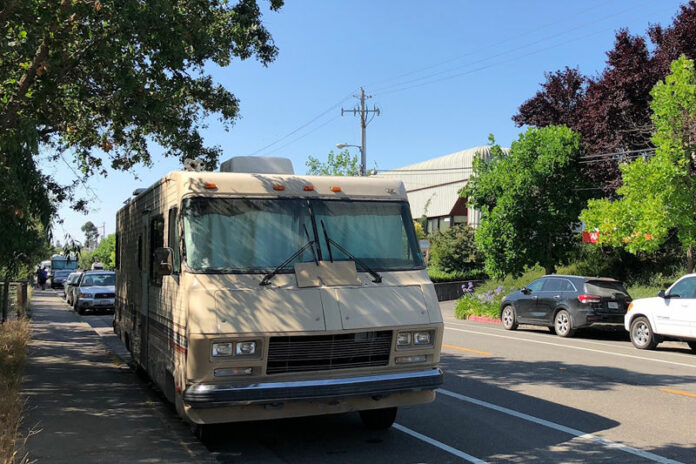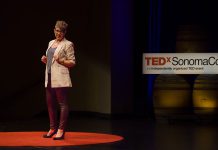
Residents of Sebastopol plunged into debate over the city’s actions to address homelessness on Morris Street at the Sebastopol City Council’s Nov. 2 meeting. The council discussed the city’s proposed RV parking village and the first monthly status report from the Committee for the Unhoused.
Although the council took no formal action, the discussions revealed much about how a community negotiates its comfort zone when a city tries to address a local case of a nationwide homelessness crisis with no perfect solutions in sight.
Councilmember Diana Rich said monthly reports from the Committee for the Unhoused — made up of herself and Mayor Una Glass — are set for Dec. 7, Jan. 18, Feb. 15 and March 15.
The Sebastopol City Council recently moved to partner with Sonoma Applied Village Services (SAVS) for a pilot program for a temporary parking village where people living in RVs lining Morris Street could relocate. Glass said the city continues to examine whether the project intended to operate for just one year could happen in Sebastopol successfully.
The proposed site is the space behind Wischemann Hall, beside the city parking lot behind the Youth Annex, on Morris Street.
The council has authorized the mayor to sign a letter of intent with SAVS. However, the city has until Dec. 8 to sign a contract with SAVS to develop the village — and take the $368,000 SAVS secured in funding from Sonoma County’s Continuum of Care to pull it off, Rich said. Glass shared that another meeting would take place before the city council decides.
She reported that the Committee of the Unhoused estimates a citywide town hall on its activities and findings will take place in probably late January or early February.
Glass said the committee has now spoken to affected parties like the Sebastopol Community Cultural Center, Wischemann Hall, the Laguna de Santa Rosa Foundation, Greenacre Homes & Schools and Morris Street businesses.
SAVS would maintain that communication, she said. Further, SAVS, city staff and the Committee for the Unhoused are listing issues in need of response, “such as health and safety, energy, sanitation, water, permits,” and more, Glass said.
The committee’s meetings with the West County Community Services (WCCS) staff continue, Glass said. WCCS was contracted by the city to coordinate and connect homeless services to Sebastopol’s unhoused residents.
Community airs views on Morris Street’s homeless community impacts
The meeting’s participants started throwing their two cents about the proposal to create an RV park village hours before the city council even reached the discussion on the agenda. Many were unconvinced that providing an RV park wouldn’t simply invite more homeless people to Morris Street and Sebastopol.
Some said they hadn’t been consulted despite the assertions they heard that SAVS was already talking to the neighboring community close to the proposed site. Rich reminded a couple speakers that they had been invited to a meeting taking place the next day.
One man against the project wanted to know if council members were putting “at least an equal amount of effort” into informing neighbors before the deadline what parking regulations they could expect as they were putting into preparing a facility for homeless people. He said more people would support the plan if the council gave more details in advance and soon.
“If you’re going to attempt to move people into this sort of RV park idea, there’s nothing to stop Morris Street just filling up with RVs and so on, so forth, the following day,” another man said, calling for parking permits. He shared he lost a young relative to an opioid overdose a year ago. “I’m very, very familiar with what goes on in the streets around the homeless. I found two needles in the gutter this morning,” he said.
Regarding Morris Street in general, City Manager-Attorney Larry McLaughlin said parking plans will come to the council at a later time since they are still under review and discussion with staff and outside counsel. SAVS President Adrienne Lauby later reminded attendees that beyond the RV village, Morris Street parking isn’t in her purview, but “for you all to figure out.”
Attendee Rick Geggie voiced his appreciation that both struggling businesspeople and Morris Street’s unhoused residents are coming together with the city council, churches and others “because what we’re looking at is the underbelly of our whole society,” he said.
“We have casualties, folks. And those casualties are growing and people are coming out of the woodwork as they can’t afford their rent, even though there was $5 billion in federal money for rent supplement unspent. And so it behooves us all to work together and to stop this schism politics thing,” he said, for the sake of the emergency.
Geggie added, “I’ve seen people selling drugs and even using drugs in a lot of the restaurants in Sebastopol, including restaurants in the Barlow … And these were not homeless people, but these were upstanding citizens. So, let’s open our eyes.”
Another attendee, Barbara, vouched that SAVS raised villages in various cities that do work. “It’s taken a number of years, it’s taken resources, but it exists. We are on the forefront of hopefully having that happen in our community, but believe me, there are models of good living for unhoused people to help them move through whatever dilemmas and difficulties their life is challenging them with right now, to get into housing, to get into employment, to get mental health services, to get addiction services.”
The evening prior, the Sonoma County Juvenile Justice Commission submitted to the council a statement of opposition to the safe parking program proposal. “The proposed site is not acceptable in regards to the safety of the residents at Greenacre Homes,” it read. “Children who are housed at Greenacres are under the auspices of the Juvenile Court of Sonoma County.”
Lauby said she felt sorry that the commission has gone against the proposed village without seeking more information from SAVS directly. She expressed confidence that the RV park and Greenacre Homes nearby could coexist, just as Los Guilicos Village does with the Valley of the Moon Children’s Home across the road, without regular issues stemming from how close they are.
“The village and the community environment we’re going to build will help people stabilize. Staff is going to work with people one on one to help them take the steps to stabilize their lives and get into permanent housing. That’s our goal,” Lauby said.
No simple solution, but questions to be asked
Councilmember Neysa Hinton recounted that the city was assured that there would be a preference for locals when the Sebastopol Inn became the Elderberry Commons, but she was uncertain whether that actually happened with the Project Homekey site.
This time around, Hinton confirmed that local preference is the only way she’ll vote to proceed with the RV parking village, meaning if the village’s parking spots aren’t all taken on the first day, they could be reserved for unhoused people identified as being from Sebastopol.
She held that although the process feels rushed, she’s learned opportunities for government funding are worth taking because they’re so hard to come by. Councilmembers Sarah Glade-Gurney and Patrick Slayter wanted more information about the RV park’s evacuation plans if disaster strikes.
Lauby didn’t disagree with those who doubted the RV village could be the ultimate fix for Sebastopol. The funding from the Continuum of Care to operate the park is only to last a year.
“It’s true what some people are saying here. This is not going to solve every problem with homeless people,” she said, acknowledging homelessness is a nationwide challenge to address.
“It’s not a simple thing to take care of people when they are so vulnerable, so poor and have been stripped of everything, including a lot of their human dignity,” Lauby said. “But this is a really simple thing, basically, that Sebastopol can do and it will make a big difference for some of the poorest people in the city.”
The mayor mentioned the successes of Park Village and then Elderberry Commons after the pandemic began. “That was a life-or-death situation,” Glass said of the Elderberry Commons Project Homekey site. “We had basically 30 days for that thing to happen and there are 30 people that are in that facility that would have been out on the street that were ill. Everybody that went in there had health issues and if they’d been out on the street with COVID, they could have very well died.”
Glass stated, “Over the years, we haven’t had the resources to do what I think needs to be done, which is creating these tiny villages, tiny homes, safe parking, parking for RVs, etc. and we’ve finally, over the past few years, as the situation has escalated and gotten worse, now there is actually some funding. And that’s why we’re jumping on this,” in agreement with Hinton over taking government funding opportunities as they come.








